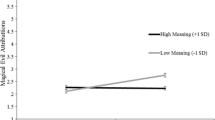Abstract
For many, religious belief is a source of meaning and a resource for coping with life stressors that have the potential to undercut meaning. In the present study, we sought to further probe the connection between religion and meaning by focusing on the potential for threatened meaning to inspire belief in miraculous testimonials. We threatened meaning with a meaninglessness manipulation and then had participants read testimonials in which people described miraculous experiences involving supernatural agents and rate the extent to which they believed these testimonials to be credible and true. Meaning threat, relative to a control condition, increased belief in miraculous stories.
Similar content being viewed by others
References
Batson, C. D., & Stocks, E. L. (2004). Religion: Its core psychological functions. In J. Greenberg, S. L. Koole, & T. Pyszczynski (Eds.), Handbook of experimental existential psychology (pp. 141–155). New York, NY: Guilford Press.
Buhrmester, M., Kwang, T., & Gosling, S. D. (2011). Amazon’s Mechanical Turk: A new source of inexpensive, yet high-quality, data? Perspectives on Psychological Science, 6, 3–5.
Emmons, R. A. (2005). Striving for the sacred: Personal goals, life meaning, and religion. Journal of Social Issues, 61, 731–745.
Fry, P. S. (2000). Religious involvement, spirituality and personal meaning for life: Existential predictors of psychological wellbeing in community-residing and institutional care elders. Aging and Mental Health, 4, 375–387.
Gebauer, J. E., & Maio, G. R. (2012). The need to belong can motivate belief in God. Journal of Personality, 80, 465–501.
Heintzelman, S. J., & King, L. A. (2014). Life is pretty meaningful. American Psychologist, 69, 561–574.
Hicks, J. A., & King, L. A. (2008). Religious commitment and positive mood as information about meaning in life. Journal of Research in Personality, 42, 43–57.
Hill, P. L., & Turiano, N. A. (2014). Purpose in life as a predictor of mortality across adulthood. Psychological Science, 25, 1482–1486.
King, L. A., & Napa, C. K. (1998). What makes a life good? Journal of Personality and Social Psychology, 75, 156–165.
Krause, N. (2004). Stressors arising in highly valued roles, meaning in life, and the physical health status of older adults. The Journals of Gerontology: Series B: Psychological Sciences and Social Sciences, 59B, S287–S291.
Krause, N. (2007). Evaluating the stress-buffering function of meaning in life among older people. Journal of Aging and Health, 19, 792–812.
Krause, N. (2009). Meaning in life and mortality. The Journals of Gerontology: Series B: Psychological Sciences and Social Sciences, 64B, 517–527.
Lambert, N. M., Stillman, T. F., Hicks, J. A., Kamble, S., Baumeister, R. F., & Fincham, F. D. (2013). To belong is to matter: Sense of belonging enhances meaning in life. Personality and Social Psychology Bulletin, 39, 1418–1427.
Paolacci, G., Chandler, J., & Ipeirotis, P. G. (2010). Running experiments on Amazon Mechanical Turk. Judgment and Decision Making, 5, 411–419.
Pargament, K. I. (1997). The psychology of religion and coping. New York: Guilford.
Park, J. L. (2001). Our existential predicament: Loneliness, depression, anxiety and death. Minneapolis, MN: Existential Books.
Park, C. L. (2005). Religion as a meaning-making framework in coping with life stress. Journal of Social Issues, 61, 707–729.
Park, C. L. (2011). Meaning, coping, and health and well-being. In S. Folkman (Ed.), The Oxford handbook of stress, health, and coping (pp. 227–241). New York, NY: Oxford University Press.
Routledge, C., Arndt, J., Wildschut, T., Sedikides, C., Hart, C. M., Juhl, J., & Schlotz, W. (2011). The past makes the present meaningful: Nostalgia as an existential resource. Journal of Personality and Social Psychology, 101, 638–652.
Routledge, C., & Juhl, J. (2010). When death thoughts lead to death fears: Mortality salience increases death anxiety for individuals who lack meaning in life. Cognition and Emotion, 24, 848–854.
Stark, R. (2002). Physiology and faith: Addressing the “universal” gender differences in religious commitment. Journal for the Scientific Study of Religion, 41, 495–507.
Steger, M. F., & Frazier, P. (2005). Meaning in life: One link in the chain from religiousness to well-being. Journal of Counseling Psychology, 52, 574–582.
Thomas, R. (n.d.). Tony Davis: Unfinished business on earth. cbn.com. Retrieved from http://www.cbn.com/700club/features/amazing/Tony_Davis_050908.aspx
Vail, K. I., Rothschild, Z. K., Weise, D. R., Solomon, S., Pyszczynski, T., & Greenberg, J. (2010). A terror management analysis of the psychological functions of religion. Personality and Social Psychology Review, 14, 84–94.
Van Tongeren, D. R., & Green, J. D. (2010). Combating meaninglessness: On the automatic defense of meaning. Personality and Social Psychology Bulletin, 36, 1372–1384.
Walter, T., & Davie, G. (1998). The religiosity of women in the modern West. British Journal of Sociology, 49, 640–660.
Worthington, E. J., Wade, N. G., Hight, T. L., Ripley, J. S., McCullough, M. E., Berry, J. W., & O’Connor, L. (2003). The religious commitment inventory-10: Development, refinement, and validation of a brief scale for research and counseling. Journal of Counseling Psychology, 50, 84–96.
Yalom, I. D. (1980). Existential psychotherapy. New York, NY: Basic Books.
Acknowledgments
The present research was funded, in part, by a Grant from the John Templeton Foundation.
Author information
Authors and Affiliations
Corresponding author
Rights and permissions
About this article
Cite this article
Routledge, C., Roylance, C. & Abeyta, A.A. Miraculous Meaning: Threatened Meaning Increases Belief in Miracles. J Relig Health 56, 776–783 (2017). https://doi.org/10.1007/s10943-015-0124-4
Published:
Issue Date:
DOI: https://doi.org/10.1007/s10943-015-0124-4




